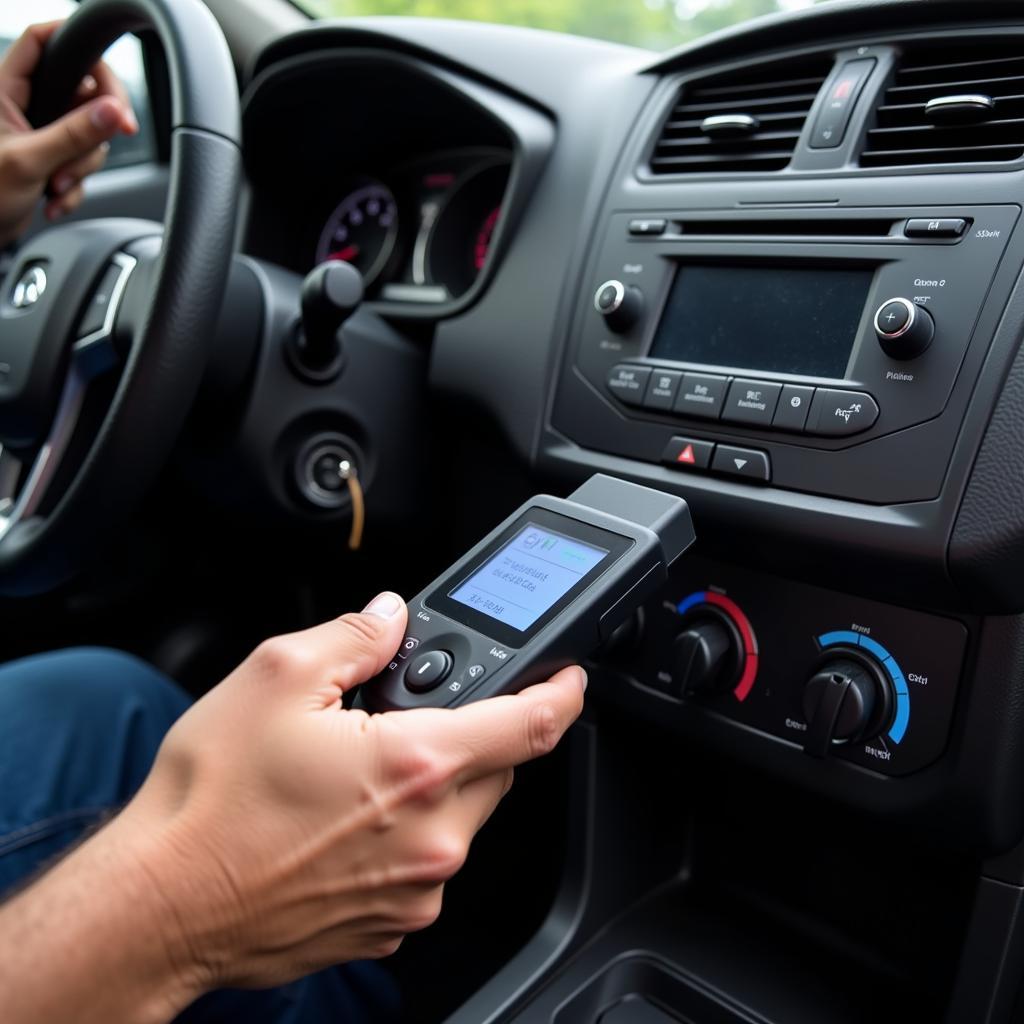A car diagnostic test, often simply called “car diagnostics,” is an in-depth analysis of your vehicle’s computer system. It’s like giving your car a health checkup, but instead of a stethoscope, it uses a specialized tool called a car diagnostic scanner. But What Does A Car Diagnostic Consist Of exactly, and what kind of information does it reveal about your car’s well-being? Let’s dive in.
Peering into Your Car’s Brain: Understanding the Diagnostic Process
At its core, a car diagnostic involves plugging a scanner into your vehicle’s onboard diagnostic port (OBD-II port). This port acts as a communication gateway to your car’s computer, allowing the scanner to retrieve and interpret data from various sensors and systems within your vehicle. Think of it as a window into the electronic brain of your car.
 Car diagnostic scanner connected to OBD port
Car diagnostic scanner connected to OBD port
Deciphering the Data: What a Car Diagnostic Reveals
A car diagnostic can unveil a wealth of information about your vehicle’s performance, health, and potential issues. Here’s a breakdown of the key areas a typical diagnostic test covers:
- Engine Performance: This includes analyzing data related to fuel efficiency, ignition timing, air intake, and exhaust emissions.
- Transmission System: The diagnostic assesses the performance of your gearbox, clutch, and other transmission components.
- Braking System: It checks for any faults within the anti-lock braking system (ABS), electronic stability control (ESC), and other braking components.
- Emission Control System: The diagnostic evaluates the efficiency of your catalytic converter and other emission control devices.
- Safety Systems: This includes analyzing the functionality of airbags, seatbelts, and other safety-critical systems.
By analyzing this data, a car diagnostic can pinpoint existing problems, predict potential issues, and provide insights into your car’s overall health.
 Car diagnostic software displaying error codes
Car diagnostic software displaying error codes
The Benefits of Regular Car Diagnostics: Why it’s Crucial for Your Car’s Well-being
You might be thinking, “My car seems to be running fine. Do I really need a car diagnostic?” The answer, in most cases, is a resounding yes. Here’s why:
- Early Detection of Problems: Like any health checkup, car diagnostics can detect problems in their early stages, even before you notice any symptoms. This allows you to address minor issues before they escalate into major (and expensive) repairs.
- Improved Fuel Efficiency: By identifying issues that might be affecting your car’s fuel economy, a diagnostic can help you save money at the pump.
- Increased Lifespan of Your Vehicle: Regular diagnostics and timely repairs contribute to a longer, healthier life for your car.
- Peace of Mind: Knowing that your car has received a clean bill of health from a diagnostic test can give you invaluable peace of mind while driving.
Car Diagnostic Codes: Unraveling the Mystery
During a car diagnostic, you might come across something called “car diagnostic codes.” These codes are standardized alphanumeric identifiers that represent specific issues detected within your vehicle’s systems. For instance, a code like “P0301” indicates a misfire in cylinder 1. To learn more about car diagnostic codes, you can read our comprehensive guide: what are car diagnostic codes.
 Mechanic explaining car diagnostic results to car owner
Mechanic explaining car diagnostic results to car owner
DIY vs. Professional Car Diagnostics: Making the Right Choice
While there are DIY car diagnostic scanners available in the market, opting for a professional diagnostic service offers several advantages. Mechanics and technicians have the experience, knowledge, and specialized tools like a car diagnostic meter to:
- Accurately interpret diagnostic codes and data.
- Identify the root cause of problems, not just the symptoms.
- Perform comprehensive system checks and analysis.
- Recommend appropriate repair solutions.
If you’re unsure about how to use a car diagnostic meter yourself, we have a helpful guide: how to use a car diagnostic meter.
When to Consider a Car Diagnostic: Recognizing the Warning Signs
While regular diagnostics are recommended, certain warning signs indicate your car might need an immediate checkup. These include:
- Illuminated Check Engine Light: This is the most obvious sign that something needs attention.
- Unusual Noises: Any new or unusual sounds coming from your engine, transmission, or other systems should be investigated.
- Performance Issues: Rough idling, stalling, decreased fuel efficiency, and difficulty starting are all potential red flags.
- Changes in Handling: If your car pulls to one side, vibrates excessively, or feels different to drive, it’s time for a diagnostic.
If you’re wondering, “Who does car diagnostics near me?”, you can find a list of reputable service providers in your area here: who does car diagnostics near me.
Understanding the Limitations: What a Car Diagnostic Can’t Do
While a car diagnostic is a powerful tool, it’s important to understand its limitations. It:
- Cannot physically fix your car: It identifies problems but doesn’t perform the actual repairs.
- May not detect every problem: Some mechanical issues might not trigger error codes or be detectable through a diagnostic test.
- Requires Expert Interpretation: Diagnostic data can be complex and requires a trained eye to interpret correctly.
Car Diagnostics: An Investment in Your Vehicle’s Future
In conclusion, a car diagnostic is more than just plugging in a scanner—it’s a comprehensive analysis of your car’s electronic systems, providing valuable insights into its health and performance. Regular car diagnostics can help you detect problems early, improve fuel efficiency, and extend the lifespan of your vehicle, ultimately saving you time, money, and potential headaches down the road. So, the next time your car needs a check-up, remember the importance of a thorough car diagnostic—it’s an investment worth making.
FAQs About Car Diagnostics:
Q1: How often should I get a car diagnostic?
A1: It’s generally recommended to get a car diagnostic at least once a year or every 12,000 miles, even if your car seems to be running fine.
Q2: How much does a car diagnostic cost?
A2: The cost can vary depending on your location and the service provider. On average, you can expect to pay between $80 to $150.
Q3: Will an intermittent fault in my car show on diagnostics?
A3: It depends on the nature of the fault. To learn more about intermittent faults and diagnostics, check out our article: will intermittent fault in car show on diagnostics.
Q4: Can I drive my car with the check engine light on?
A4: While it might be possible to drive for a short distance, it’s highly recommended to get your car checked by a mechanic as soon as possible. Driving with the check engine light on could potentially worsen the problem or lead to further damage.
Q5: Can I reset the check engine light myself?
A5: Yes, you can reset the check engine light yourself using a code reader or scanner. However, this is only a temporary solution.
Need assistance with car diagnostics or have more questions? Our expert team at DiagFixPro is here to help. Contact us via WhatsApp: +1(641)206-8880 or email: [email protected]. We offer 24/7 customer support.

Leave a Reply